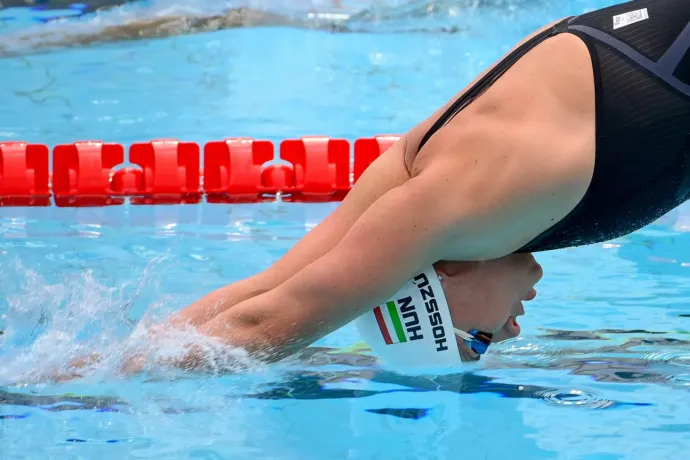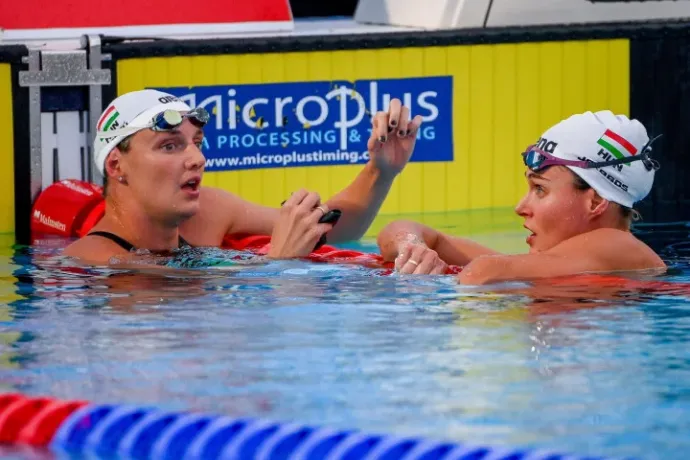
“I was a bit sad that I didn’t get the bronze, because it would have gotten me that much closer to having 100 medals, which is my most important goal. It definitely stings a little, but it's probably better to say that I find it motivating. It should all come together for the European Championships in August, I will be working on it.” – it was with these words that Katinka Hosszú finished the World Championship in Budapest on June 25th.
She herself pointed out that she was the best European competitor in both the 400- and 200-meter individual medley, which gave her reason to hope for good results in the future. Six weeks later, this didn't happen. Hosszú is leaving the European Championship in Rome with one bronze medal (this is her 97th medal), and probably many lessons learnt. She has to draw the conclusions herself, since no coaching assessment has been made of her in over a year- a period when Hosszú’s fiancé, Máté Gelencsér was in charge of her training.
She won her only medal at the European Championships with the 4x200 freestyle relay. Even here, she only participated in the final, and she was the only one of the four who took more than 2 minutes to finish, being the slowest in the group.
Although she was the fourth fastest in the qualifications for the 400 meter individual medley, according to the rules she could not compete in the final, because two Hungarian swimmers – Viktória Mihályvári-Farkas, who ended up winning, and Zsuzsa Jakabos, who won the silver medal – were faster than her. In the 200-meter medley she qualified to the final with the third best time, but decided to swim in the 200-meter butterfly qualification round right before the medley final. In the end, she came in eighth, having swum two full seconds faster in the qualifier round and one second faster in the semi-final.

“It must be very difficult for her mentally, having been the one ahead for years, and now being stuck in the back. It must have been very difficult for her to get over the first few failures. I know what swimming means to her, I see that she still wants to swim – I am in a similar situation myself. Letting go is not easy when being on the national team has been your dream since you were little, and you still want to do something big. She will sit down and clarify this matter. Katinka has proven that she is able to stand up after the punches, and that she is not the type to give up easily. Especially now that she is also focusing on her private life and after six hours of training makes time for everything else and makes sure she is not be late from anywhere” – Evelyn Verrasztó, who is the same age as Hosszú, evaluated the performance of the 33-year old swimmer on Hungary’s M4 TV channel. (They won a gold medal together in 2010 as members of the 4x200 meter freestyle relay team.)
Former Hungarian Olympic swimmer, Ágnes Mutina commented: “Once she's let the genie out of the bottle and had a taste of a more relaxed life, she now has to decide whether she is once again able to give up certain things and commit to the same discipline that has brought her success before.” She added: “It is not good to see Katinka come in eighth”.
Hosszú’s public statements also reflect an inner struggle. At the opening of her restaurant, she told Forbes magazine:
“The 2024 Paris Olympics are too distant for me, and it is not likely that I will be there, as my fiancé and I would like to have children.”
The wedding will be next week, by the way. Her bridal shower was during the preparations for the European Championships, and it seems this did not help her shape.
On the other hand, a few days before the EC in Rome, she said that the Paris Olympics are on her mind, and that she has signed a contract with sporting-goods manufacturer Arena which is valid up until the Olympic Games.
Having seen the decline in her form at the European Championships, we gathered her results from the last 5 competitions. The numbers in parentheses show where she placed. If there is no number, it means she did not make it to the final.
Árpád Petrov coached her before the 2019 World Championships, and after that she briefly worked with József Nagy, but she did not compete anywhere during that time. Since then, her fiancé Máté Gelencsér has been her coach – at least on paper, but the word is that she mostly coaches herself. Her results behind closed gates in Budapest in May 2021 were encouraging, but she failed to improve for the Olympics. In fact, she has not achieved those results even once since then. It is also evident that since the World Championships in June, she has not been able to gain speed for the European Championships, which had much less competition, and in fact she has't even been able to stay at the same level.
| Discipline | World Champs, 2019 | European Championships, 2021 | Olympics Games, 2021 | World Champs, 2022 | European Championships, 2022 |
| 200 m IM | 2:07,53 (1) | 2:10,12 (3) | 2:12,38 (7) | 2:11,37 (7) | 2:14,37 (8) |
| 400 m IM | 4:30,39 (1) | 4:34:76 (1) | 4:35,98 (5) | 4:37,89 (4) | 4:45,07 |
Finishing well is not easy for great champions. We have seen this many times in this sport. Take Dániel Gyurta for example, who didn't finish well at the 2017 World Championships held in his home country, and there is also the example of Norbert Rózsa. A good counter-example is László Cseh, who got out of the pool with an Olympic final, and with the Chinese winner bowing to him.
There will be another short course World Championship this year, in Melbourne, Australia. Hosszú had originally planned to go because it is where she had first competed in an adult World Championship, back in 2007. If she prepares well, we can only support her goal, especially since her turns and underwater work, which she learned in America, have always been above average, and that can be an advantage on a short course. But another poor result could be damaging to her, her confidence and the image she has built up through systematic work.
For more quick, accurate, and impartial news from and about Hungary, subscribe to the Telex English newsletter!
The translation of this article was made possible by our cooperation with the Heinrich Böll Foundation.